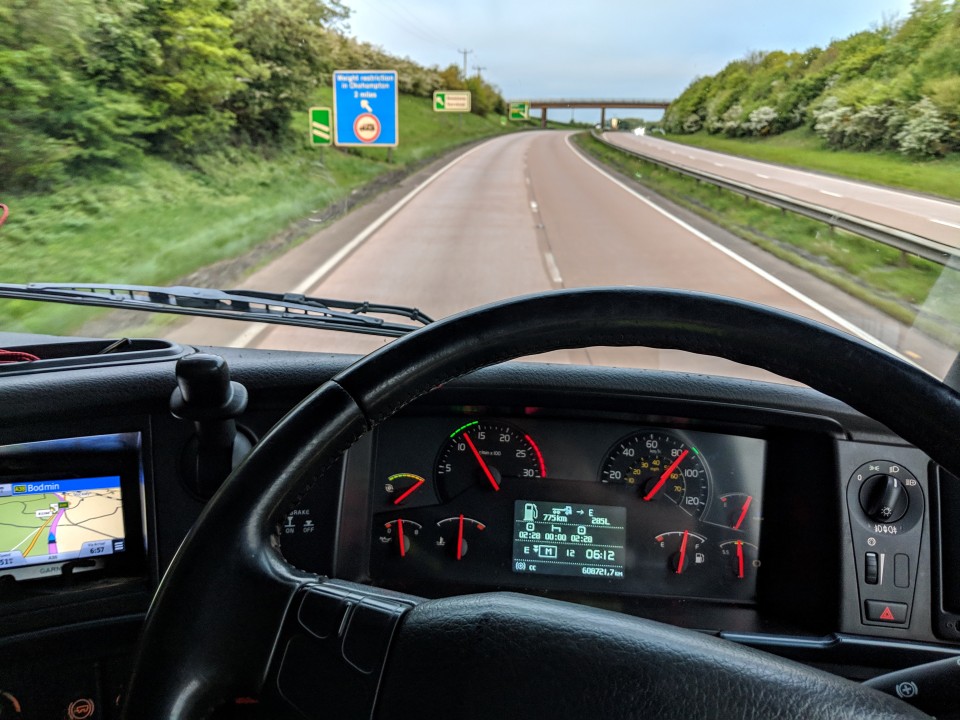
Susie Jones
Verveel je je onderweg?
Gemaakt: 27-08-2024
•
Bijgewerkt: 27-08-2024
De gemiddelde vrachtwagenchauffeur zit elke dag ongeveer 12 uur achter het stuur. Eindeloze tijd op de open weg klinkt misschien aantrekkelijk, maar de realiteit is een schril contrast. Talloze tankstations, rustplaatsen en lange uren kunnen vervelend worden. Truckers brengen hun vrije tijd vaak buitenshuis door en het kan een uitdaging zijn om verveling te voorkomen.
Uit recent onderzoek van Convoy bleek dat verveling een van de grootste uitdagingen is voor vrachtwagenchauffeurs. Welk effect heeft verveling op het welzijn van chauffeurs? En hoe kunnen vrachtwagenchauffeurs zich blijven vermaken?
Hoe verveling het welzijn van chauffeurs beïnvloedt
Vermoeidheid, isolatie, eenzaamheid en een gebrek aan mentale stimulatie zijn veelvoorkomende problemen voor bestuurders. Sommige bestuurders kunnen deze problemen aanpakken met ongezonde copingmechanismen, zoals te veel eten, roken of overmatig cafeïnegebruik. Na verloop van tijd kunnen deze gewoonten een negatieve invloed hebben op de mentale gezondheid.
Maar nu er steeds meer wordt gesproken over geestelijke gezondheid, kiezen steeds meer chauffeurs een andere weg om dit tegen te gaan. We vroegen vrachtwagenchauffeurs op Facebook wat ze doen als de verveling toeslaat.
"Luisterboeken, voornamelijk psychologie. Muziek, kletsen met dierbaren of luisteren naar de radio. Of ik zet alles uit en heb een vredig bestaan met mijn eigen gedachten," zegt Nigel.
Anderen hebben verteld hoe telefoneren met dierbaren heeft geholpen. Ashleigh zegt:
"Praten met mijn vrienden in een groepschat. Eerlijk gezegd, als ik die niet had, was ik allang gestopt. De weg gooit wat rotzooi op en zonder te praten met echt goede vrienden had ik het nooit overleefd."
Karl vindt ook dat een "groepsgesprek met vrienden een must is".

Verveling achter het stuur voorkomen
In tegenstelling tot wat vaak wordt gedacht, is het besturen van een vrachtwagen een fysieke bezigheid - chauffeurs hebben coördinatie en concentratie nodig om ongelukken te voorkomen. Desondanks kan langdurig achter het stuur zitten vermoeidheid veroorzaken. Het risico bestaat dat een chauffeur zelfgenoegzaam wordt, vooral als hij zijn route goed kent. Hoe kunnen bestuurders omgaan met zelfgenoegzaamheid achter het stuur?
Of het nu luisteren is naar een podcast of een aanstekelijk deuntje, bestuurders moeten iets kiezen dat hun geest alert houdt. We hebben een lijst samengesteld met dingen die verveling achter het stuur tegengaan.
Podcasts: Vrachtwagenchauffeur Marty luistert naar "tientallen podcasts" tijdens het rijden. Podcasts zijn een uitstekende manier om dingen af te wisselen en iets nieuws te leren. Bekijk deze [nuttige lijst met podcasts voor vrachtwagenchauffeurs] (https://www.alltruckjobs.com/blog/trucking-podcasts-better-radio/)
Muziek: "Muziek, muziek en nog eens muziek" is Richard's middel tegen verveling. Of je nu naar de radio luistert of meezingt met een afspeellijst, muziek is een uitstekende manier om je geest alert te houden.
Neem een pauze: Hoewel chauffeurs strikte deadlines en tachograafvoorschriften hebben, helpt het om uit de cabine te stappen wanneer de verveling toeslaat om de geest weer op scherp te zetten.
Verveling tijdens stilstand
Truckers staan voor extra uitdagingen om zichzelf te vermaken na hun dienst. Een proactieve aanpak om verveling tijdens deze periode te voorkomen is noodzakelijk. We hebben een lijst samengesteld met manieren om de uren door te brengen.
Locatie: Truckstops met een uitgebreid aanbod aan faciliteiten en een gemeenschappelijke sfeer zijn een uitstekende manier om verveling tegen te gaan. Sommige fungeren als een sociaal centrum waar truckers soortgelijke ervaringen kunnen delen. Ga naar onze locatiepagina om te zien welke faciliteiten onze SNAP-servicepartners bieden.
Bewegen: Dagelijks een wandeling maken of creatief zijn met je workouts kan verveling voorkomen en ervoor zorgen dat je fit en gezond blijft. Bekijk onze tips voor gezond onderweg blijven
Streamingdiensten: De nieuwste tv-show bekijken of door sociale media scrollen. Vrachtwagenchauffeur Steve houdt ervan om "te scrollen en commentaar te geven op Facebook en Netflix te kijken" om de tijd te doden.
Hobby's: De mogelijkheden zijn eindeloos. Een instrument leren, een vreemde taal leren, tekenen, schrijven en nog veel meer. Een hobby oppakken is een effectieve manier om verveling tegen te gaan.
Koken: Koken in de cabine heeft veel voordelen. Het voorkomt niet alleen verveling, maar het bespaart ook geld en is gezonder.
Blijf in contact met je dierbaren: De vrije tijd van een vrachtwagenchauffeur biedt de perfecte gelegenheid om contact op te nemen met zijn naasten. Videogesprekken zijn een effectieve manier om dichter bij familie en vrienden te staan.
Ontspan: Vrachtwagenchauffeurs kunnen te maken krijgen met stressvolle situaties. Volledig ontspannen na een dienst kan het welzijn van de chauffeur verbeteren. Ontspanningstechnieken zoals diepe ademhalingsoefeningen en meditatie verminderen stress.
Hoewel sommige chauffeurs genieten van de eenzaamheid en onafhankelijkheid die de open weg biedt, is het voor velen nog steeds een uitdaging om verveling tegen te gaan. Door de aard van het werk hebben vrachtwagenchauffeurs vaak last van lange periodes van verveling. Om hun welzijn, werktevredenheid en verkeersveiligheid te verbeteren, moeten ze manieren vinden om deze te verlichten. Of ze zich nu concentreren op hun taak, naar de radio luisteren of kletsen met vrienden en familie, de meeste vrachtwagenchauffeurs kunnen een oplossing vinden die voor hen werkt.

Waar slapen vrachtwagenchauffeurs?
De meeste chauffeurs slapen in hun cabine omdat deze goed is uitgerust voor een comfortabele nachtrust. Een standaard slaapcabine heeft een bed, opbergruimte, verlichting en stopcontacten - waardoor het een thuis weg van huis wordt.
Door het huidige Europese parkeertekort parkeren veel bestuurders in uitwijkhavens. Dit wordt als onveilig beschouwd en maakt de chauffeur kwetsbaar voor diefstal. Vanaf november 2017 moeten vrachtwagenchauffeurs in het Verenigd Koninkrijk regelmatig een wekelijkse rustpauze inlassen op een geschikte rustplaats (zoals serviceplaatsen en truckstops).
SNAP's Depot Parking regeling stelt vloten in staat om hun vrachtwagenparkeerplaatsen aan te bieden aan het netwerk, waardoor het tekort wordt verminderd en chauffeurs kwetsbare situaties kunnen vermijden. Daarnaast biedt SNAP meer dan 450 servicepartners in heel Europa waar chauffeurs kunnen parkeren. Ga naar onze kaartenpagina voor meer informatie.
Waarom laten vrachtwagenchauffeurs hun trailerdeuren open?
Als je wel eens 's nachts over een hoofdweg hebt gereden, is het je misschien wel eens opgevallen dat vrachtwagens geparkeerd staan met hun laaddeur open. Veel chauffeurs doen dit om dieven af te schrikken, omdat ze ervan uitgaan dat er niets te stelen valt als de deur van de trailer open is. Dit wordt vooral gedaan bij trailers met een schuifzeil, omdat het dieven ervan weerhoudt het schuifzeil open te breken om te zien wat er in de trailer zit.



